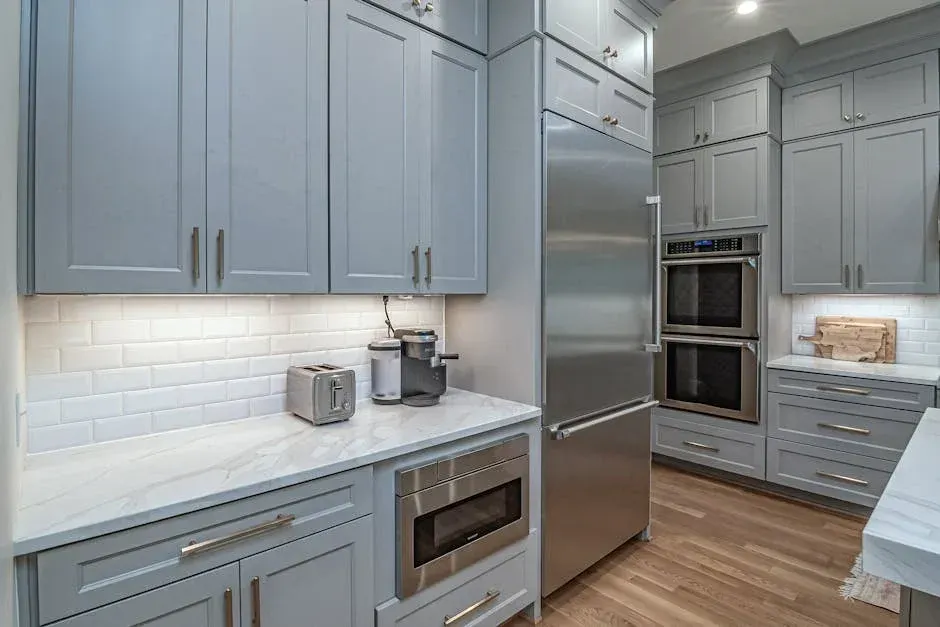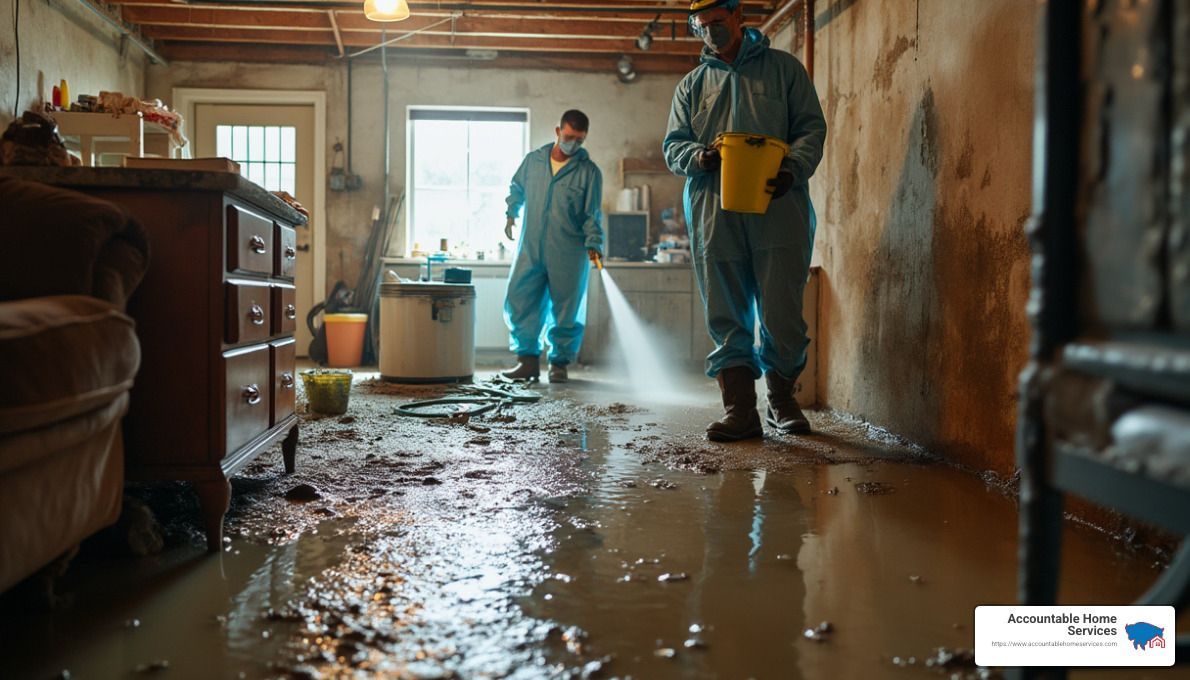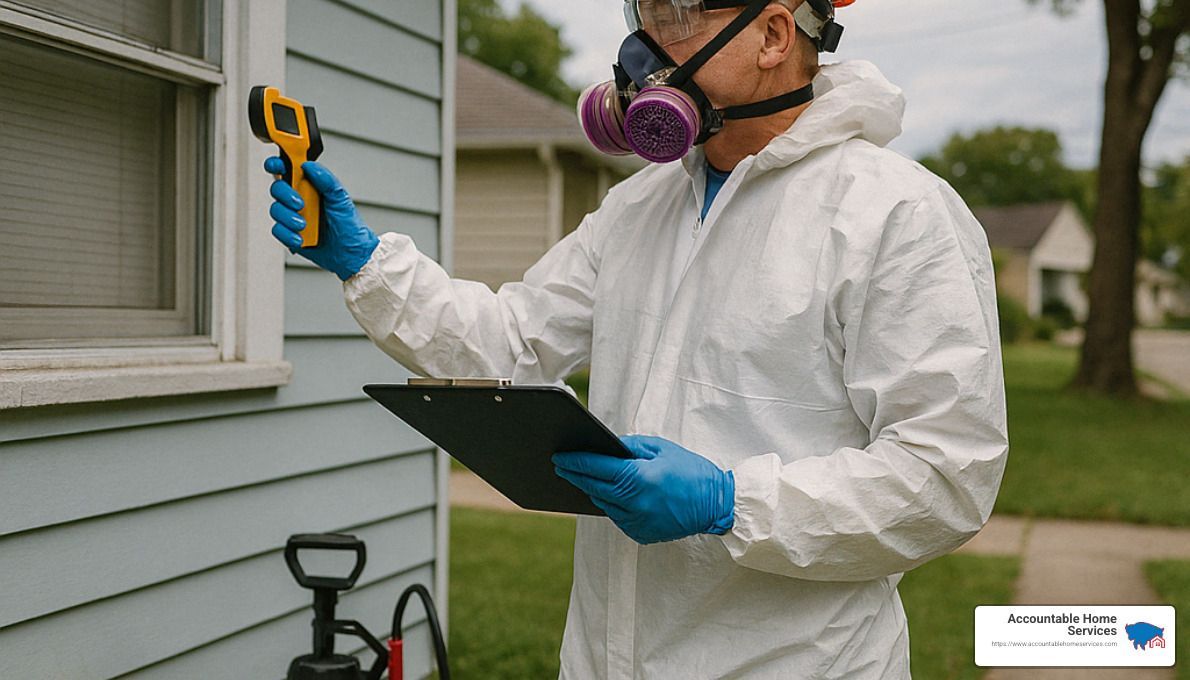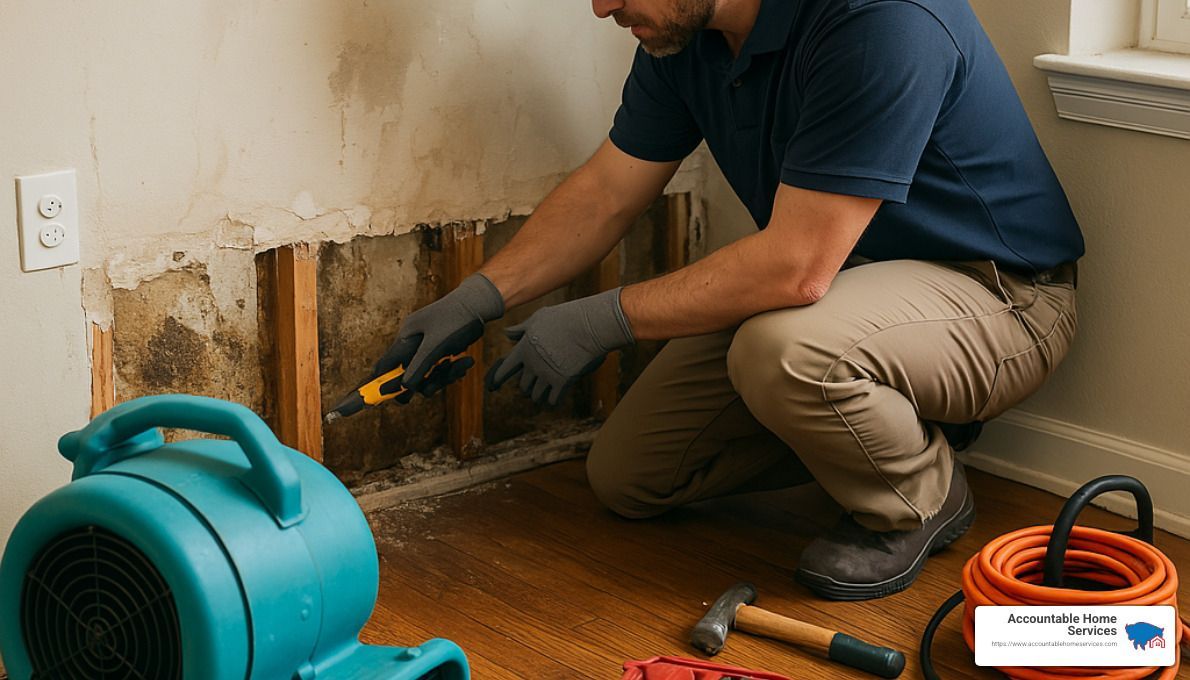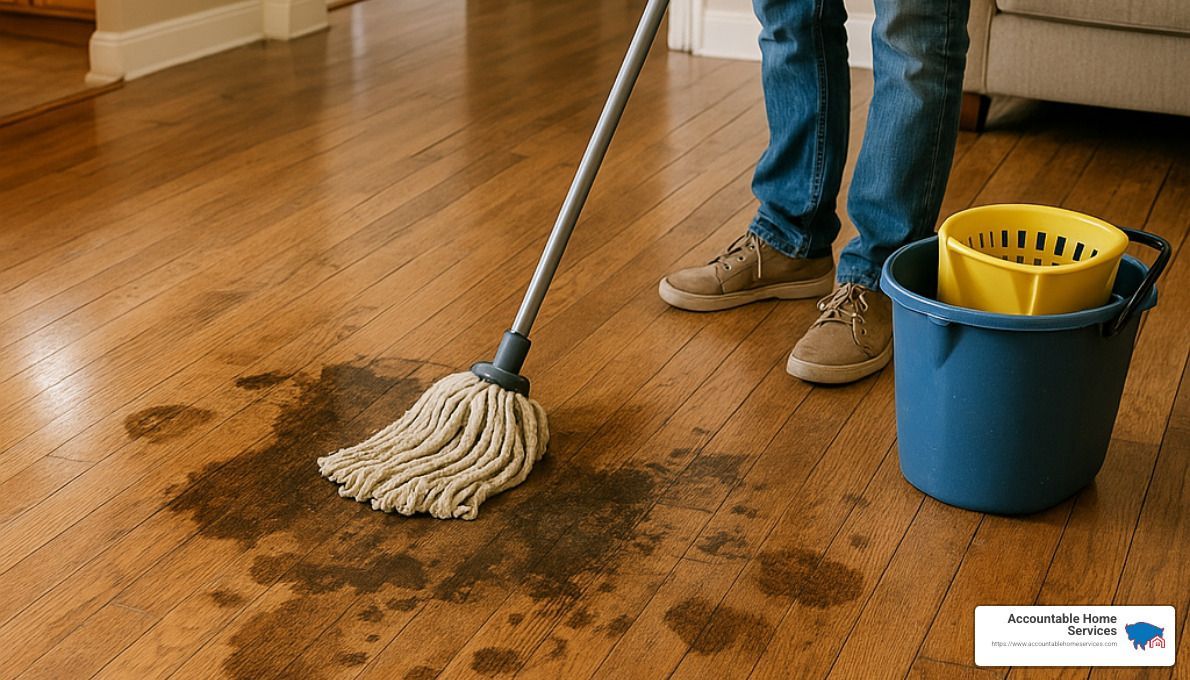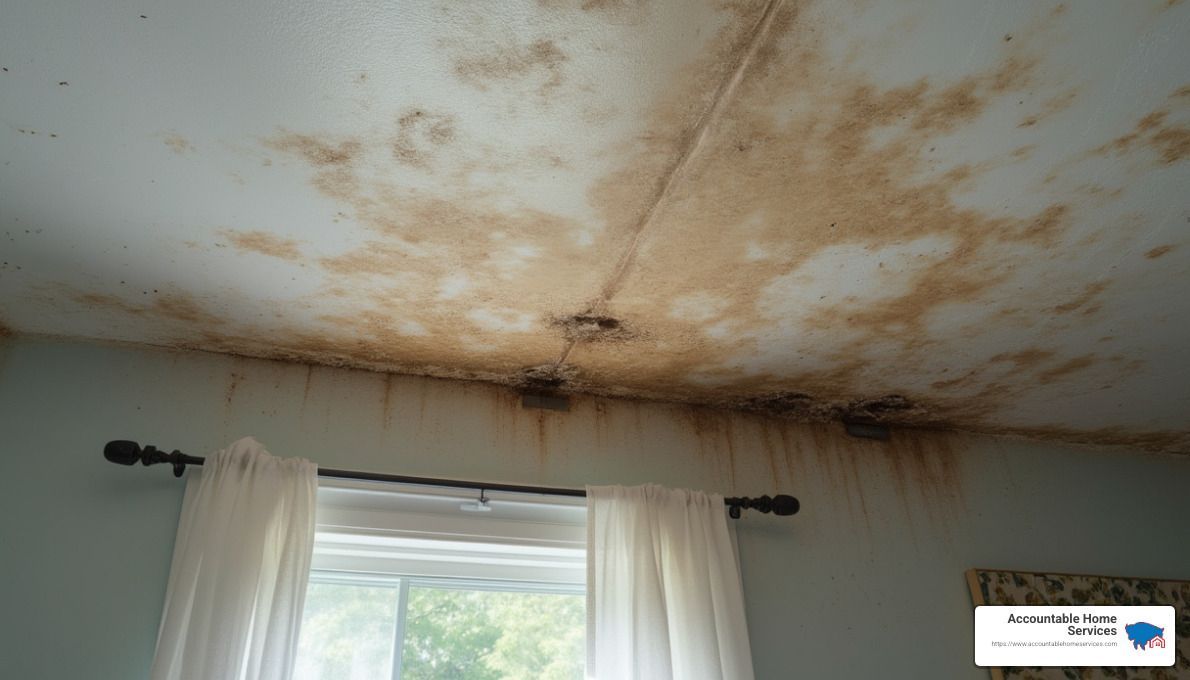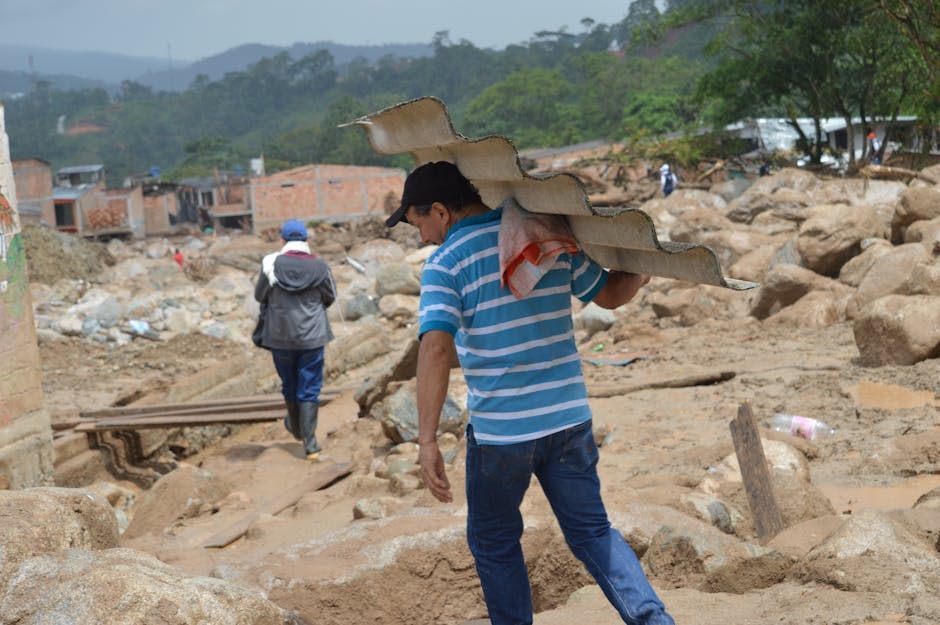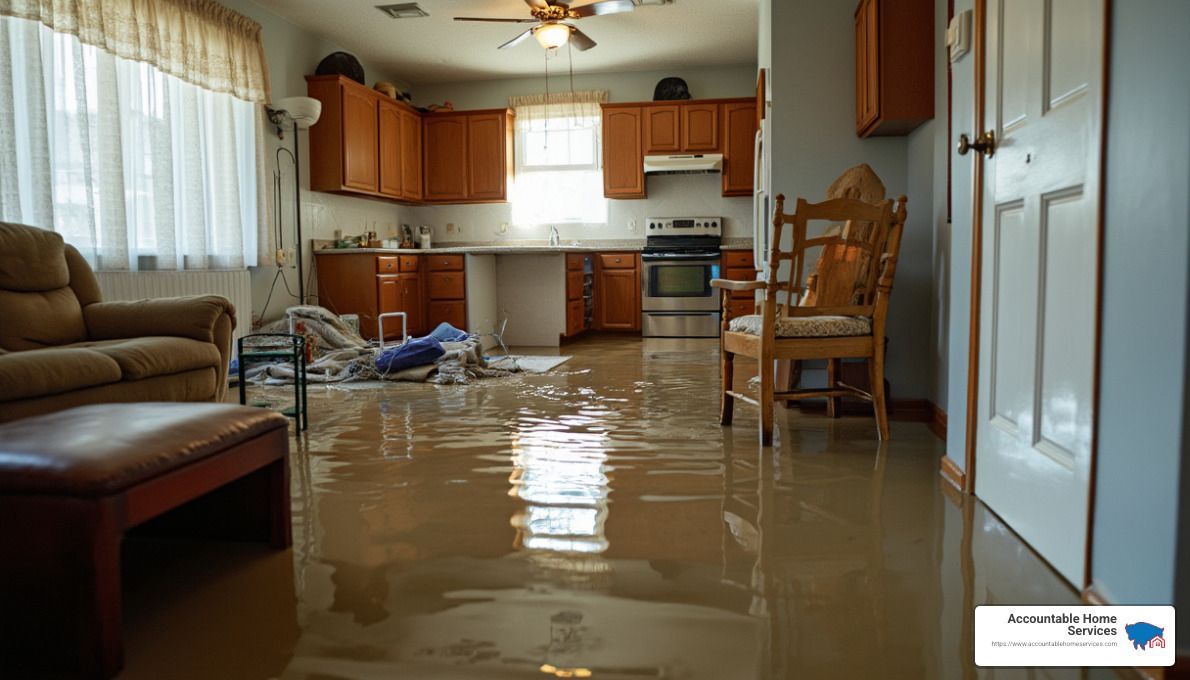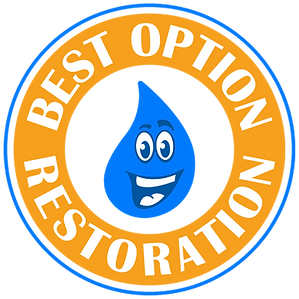Blog
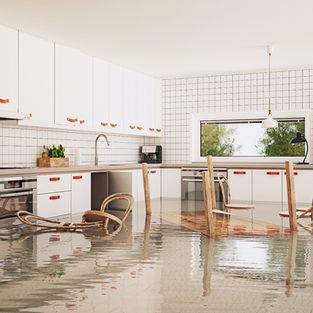
Water damage prevention tips are crucial for every homeowner looking to keep their property safe, especially in the Denver Metro Area. Quick wins to prevent water damage:
- Check for leaks regularly in sinks, toilets, and appliances.
- Monitor your water bill
for unexpected spikes.
- Keep gutters clean and install gutter guards.
- Insulate pipes to prevent freezing and bursting.
- Inspect your roof for missing shingles and damage.
Water can be both a homeowner's friend and enemy. While it's vital for everyday living, water can cause significant damage if not properly managed. For the residents of Denver and its surrounding areas—Broomfield, Westminster, Thornton, and beyond—the cold climate and heavy snow can amplify the risks of water damage. This makes proactive home maintenance not just a recommendation, but a necessity.
When snow turns to water, or leaks go unnoticed, your home structure and safety are at risk. By understanding and implementing effective strategies, you can minimize potential damage, avoid costly repairs, and maintain a safe, comfortable environment for your family. Let's explore essential tips that every homeowner should know.
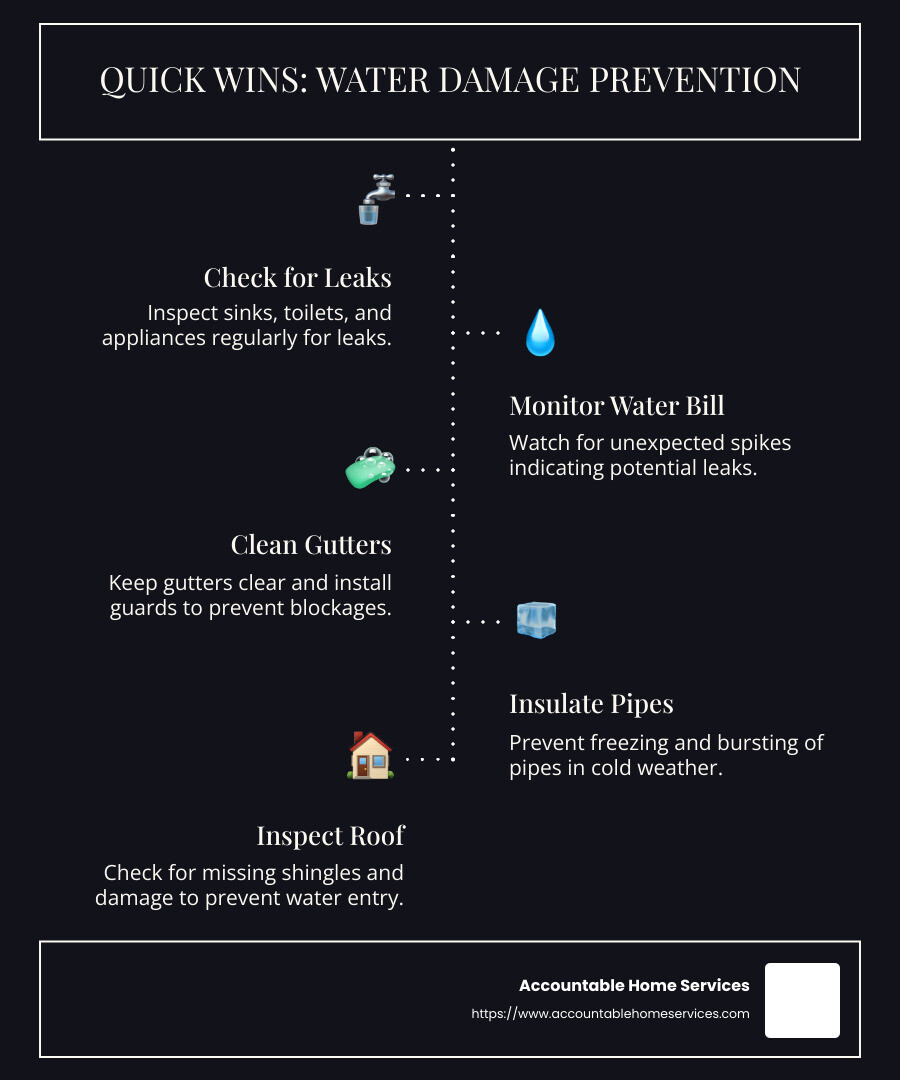
Understanding Water Damage
Water damage is a sneaky culprit that can lead to significant property loss if not addressed promptly. It's not just about wet carpets or a leaky roof—water damage can affect the very foundation of your home. In areas like Denver, where the climate can be harsh, understanding the common causes and risks is essential to protecting your investment.
Common Causes
Water damage often stems from a few usual suspects:
- Leaking Pipes: Over time, pipes can corrode or crack, leading to leaks. These leaks can cause gradual damage, often going unnoticed until it's too late.
- Appliance Malfunctions: Dishwashers, washing machines, and water heaters are common culprits. Regular maintenance is key to preventing unexpected failures.
- Roof Damage: Missing shingles or damaged flashing can allow water to seep into your home, especially after heavy snowfall or rain.
- Foundation Cracks: Water can infiltrate through even the smallest cracks in your foundation, leading to significant structural issues over time.
Property Loss
The financial impact of water damage can be staggering. According to the Insurance Information Institute, water damage is one of the most common causes of property loss, second only to wind and hail damage. Repairs can range from minor fixes to extensive overhauls, depending on the extent of the damage.
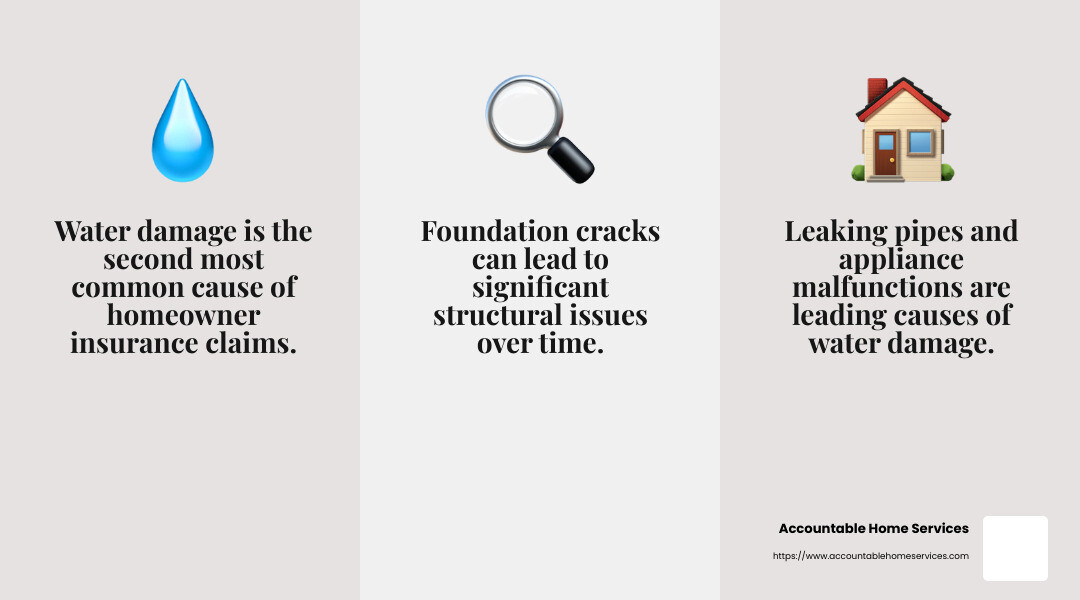
Year-Round Risk
Unlike seasonal threats like hail or wind, water damage is a year-round risk. In winter, freezing temperatures can cause pipes to burst, while in summer, unattended leaks can lead to mold and mildew growth. The key is to be vigilant and proactive.
For Denver residents, the winter months bring additional challenges. Ice dams, formed when snow melts and refreezes at the roof edge, can lead to leaks and water damage inside the home. Regular roof inspections and proper insulation can mitigate these risks.
Being aware of these common causes and taking preventive measures can save you from costly repairs and maintain the safety of your home. Stay tuned for our next section, where we'll dig into practical tips for preventing water damage in your home.
Water Damage Prevention Tips
Water damage is a serious threat to your home, but with a few proactive steps, you can protect your property from costly repairs. Let's explore some essential water damage prevention tips.
Plumbing Checks
Regular plumbing checks are crucial. Inspect your pipes for leaks, corrosion, or cracks. Pay special attention to areas like under sinks, around appliances, and in basements. Tighten loose fittings and replace worn-out hoses. This simple routine can prevent surprise leaks that lead to water damage.
- Tip: Turn off the main water line before inspecting to avoid accidental flooding.
Water Sensors
Water sensors are your home's silent guardians. Install them near appliances like dishwashers and water heaters, and in areas prone to leaks. These devices alert you to leaks before they cause significant damage.
Consider: Smart water sensors that connect to your phone for real-time alerts.
Sump Pump Maintenance
If your home has a basement, you likely have a sump pump. This device is vital for preventing basement flooding. Test your sump pump regularly to ensure it's in working order. Fill the pit with water to see if it activates and drains correctly.
- Remember:
Replace the sump pump if it's not functioning properly to avoid unexpected basement floods.
Foundation Inspection
Your home's foundation is its backbone. Inspect it for cracks or signs of water seepage. Even small cracks can lead to major water damage over time. If you spot any issues, consider hiring a foundation repair specialist.
- Pro Tip:
Use epoxy sealer for minor non-structural cracks.
Electrical Systems
Water and electricity don't mix. Ensure your electrical systems are safe from potential water exposure. Check that outlets and wiring in basements or near water sources are properly insulated and liftd.
- Safety First: Install ground fault circuit interrupter (GFCI) outlets in areas prone to moisture.
By incorporating these water damage prevention tips into your home maintenance routine, you can safeguard your property against potential water-related disasters. Next up, we'll explore essential exterior maintenance strategies to further protect your home.
Exterior Maintenance
Keeping the exterior of your home well-maintained is a key step in preventing water damage. Let's look at some practical tips to help you protect your home's exterior.
Gutters and Downspouts
Gutters and downspouts are your first line of defense against water damage. They channel rainwater away from your home, preventing it from seeping into your foundation.
- Clean your gutters at least twice a year to remove leaves and debris that can cause blockages. Clogged gutters can lead to water overflow, which may damage your roof and walls.
- Secure downspouts so they direct water at least three feet away from your home's foundation. If necessary, use extensions to ensure proper water drainage.
Roof Inspection
The roof is your home's shield against the elements. Regular inspections can help you spot issues before they become major problems.
- Look for missing or cracked shingles from the ground. These can let water seep in and cause leaks.
- Check around your chimney and roof vents for signs of wear and tear. Repair any damage promptly to avoid water intrusion.
Landscaping
Good landscaping practices can prevent water from pooling around your home.
- Trim trees and shrubs near your house. Overgrown roots can damage your foundation or underground pipes.
- Ensure your yard slopes away from the house to direct water away naturally. If your yard is flat, consider installing a French drain to help with water drainage.
Water Drainage
Proper water drainage is essential to prevent water from accumulating around your home.
- Inspect your drainage systems regularly to ensure they are free of obstructions.
- If you notice water pooling in certain areas, consider regrading your yard or installing additional drainage solutions.
By focusing on these exterior maintenance tasks, you can significantly reduce the risk of water damage to your home. Up next, we'll discuss how to maintain your home's interior to keep it safe and dry.
Interior Maintenance
Keeping your home's interior in good shape is crucial for preventing water damage. Here are some key areas to focus on:
Water Main
Your water main is the gateway for all the water entering your home. Knowing its location and how to shut it off is vital in an emergency.
- Locate your water main and ensure everyone in the household knows where it is. In the event of a leak, shutting it off quickly can prevent extensive damage.
- Consider installing a smart water shutoff device that can automatically turn off the water if a leak is detected.
Appliance Maintenance
Appliances like washing machines and dishwashers are common sources of leaks.
- Inspect hoses regularly for signs of wear and tear. Replace them every five years to prevent leaks.
- Check for water pooling under or around appliances. If you notice any, investigate immediately to prevent further damage.
Leak Detection
Detecting leaks early can save you a lot of trouble and expense.
- Install water leak sensors in areas prone to leaks, such as under sinks and near water heaters. These sensors can alert you to leaks before they cause significant damage.
- Keep an ear out for unusual sounds like dripping or rushing water, even if you can't see a leak.
Water Pressure
High water pressure can stress your plumbing system, leading to leaks.
- Use a water pressure gauge to check your home's water pressure. It should be between 40 and 70 psi. If it's too high, consider installing a pressure regulator.
- Regularly monitor your water pressure, especially if you notice any changes in water flow or hear banging noises in your pipes.
Water Bill Monitoring
An unexpected increase in your water bill could signal a hidden leak.
- Review your water bill each month. If you see a sudden spike in usage without a clear reason, it's time to investigate for leaks.
- Compare your bill with previous months to spot any unusual patterns.
By staying on top of these interior maintenance tasks, you can safeguard your home against water damage. Next, we'll explore how to protect your home's structure to ensure long-term durability.
Protecting Your Home's Structure
Protecting your home's structure is key to avoiding long-term water damage. Here's how you can fortify your home:
Basement Waterproofing
Basements are prone to water seepage, especially during heavy rains. Waterproofing your basement can prevent this.
- Reseal your basement if you notice any water seepage. Use water sealant paint on walls and floors to block moisture.
- Ensure proper drainage around your home. Make sure the ground slopes away from your foundation to direct water away.
Pipe Insulation
Freezing temperatures can cause pipes to burst, leading to significant water damage. Insulating your pipes is a simple yet effective solution.
- Use foam pipe insulation to cover exposed pipes, especially those in unheated areas like basements and attics.
- During extreme cold, let faucets drip to keep water moving and prevent freezing.
Emergency Pressure Release Valve
An emergency pressure release valve is a small addition to your plumbing system that can prevent big problems.
- Install an emergency pressure release valve to protect against pipe bursts due to increased pressure from freezing.
- This valve can save you from costly repairs by allowing excess pressure to escape safely.
By taking these steps, you can significantly reduce the risk of water damage to your home's structure. Next, we'll look at some frequently asked questions about water damage prevention.
Frequently Asked Questions about Water Damage Prevention
Water damage can be a homeowner's nightmare, but with the right knowledge, you can keep your home safe and dry. Below, we answer some common questions about preventing water damage.
How do I prevent water damage?
Preventing water damage starts with regular plumbing checks. Inspect hoses and faucets for leaks, especially those connected to appliances like washing machines and dishwashers. Regular maintenance can catch small issues before they turn into big problems.
Water sensors are another great tool. These devices alert you to leaks in real-time. Place them near high-risk areas like water heaters, sump pumps, and washing machines.
Speaking of sump pumps, ensure yours is in good working order, especially if your home has a basement. Test it by pouring water into the pit to see if it activates and drains properly. A working sump pump can prevent basement flooding.
What is the number one cause of water damage in a home
The most common cause of water damage is leaking pipes. Over time, pipes can develop small leaks due to corrosion, high water pressure, or freezing temperatures. Regularly inspecting your pipes can help you catch leaks early.
High water pressure can also lead to leaks. Install a water pressure gauge to monitor and adjust your home's water pressure if needed.
Freezing temperatures are another culprit. When water freezes, it expands and can cause pipes to burst. Insulate your pipes and let faucets drip during cold snaps to prevent freezing.
How long should you run fans after water damage?
Running fans is crucial for drying out areas affected by water damage. The length of time depends on several factors, including humidity levels and the extent of the damage.
In general, keep fans running until the area is completely dry. Use a dehumidifier to help reduce humidity and speed up the drying process. Check moisture levels with a moisture meter if available.
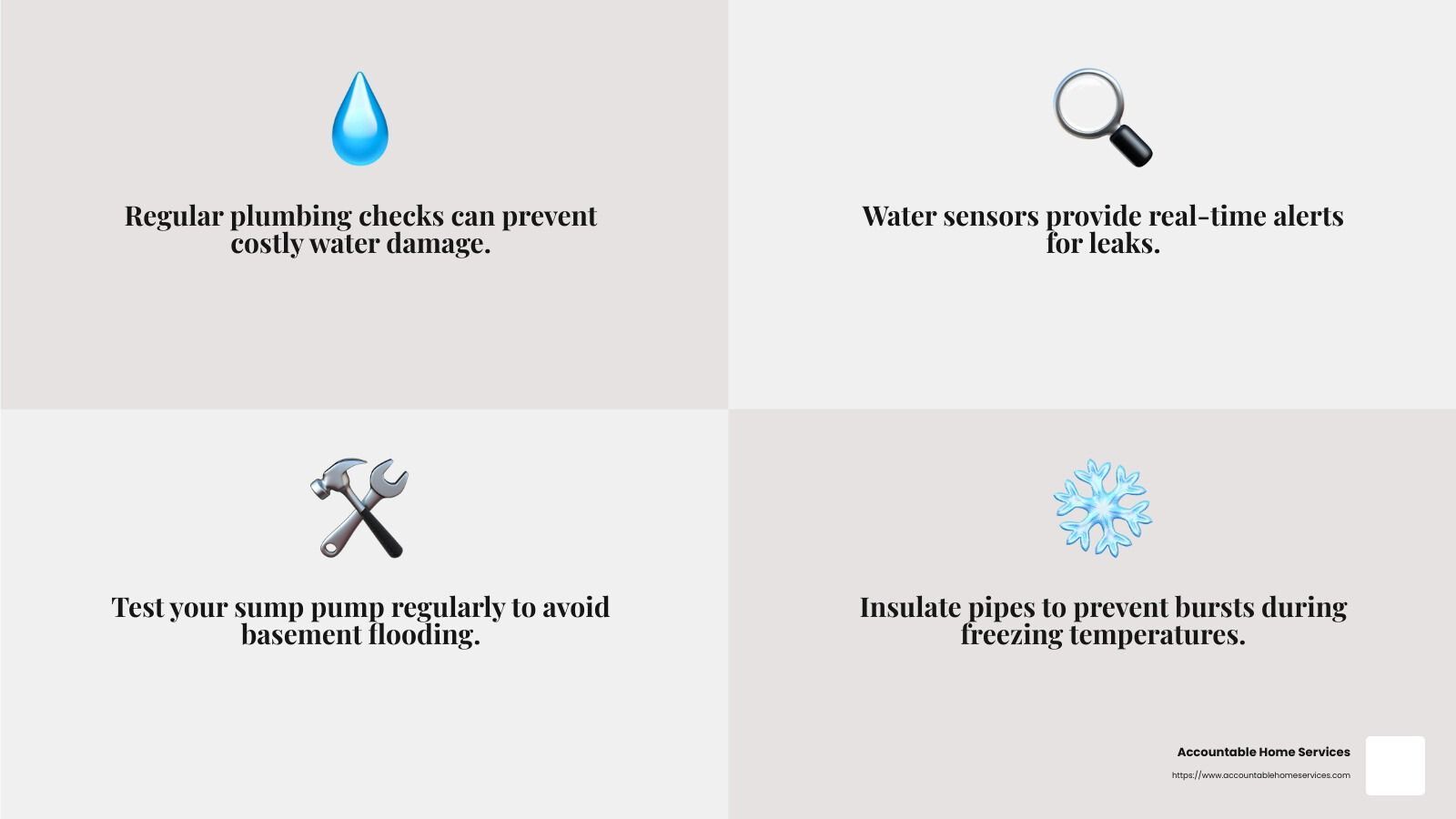
By following these tips, you can effectively manage and prevent water damage in your home. Up next, we'll explore how maintaining your home's exterior can further protect against water-related issues.
Conclusion
At Accountable Home Services, we understand that water damage can be a significant concern for homeowners in the Denver Metro Area. Our team is dedicated to providing top-notch restoration and home improvement services to help you protect your home from potential damage.
Our family-owned company specializes in water, fire, mold, and asbestos remediation, ensuring that each restoration project is handled with care and expertise. We offer 24/7 emergency response services and direct insurance billing, aiming to minimize the stress associated with unexpected home repairs.
Beyond disaster recovery, we also provide comprehensive home improvement solutions custom to Colorado's unique climate. Whether you're looking to upgrade your home with energy-efficient features or undertake a complete remodeling project, our skilled technicians are here to help. We prioritize transparent communication and top-quality craftsmanship in every project, ensuring long-lasting solutions that improve your home's value and safety.
For more information on our water damage restoration services, visit our Water Damage Restoration page. Let us be your trusted partner in maintaining a safe and comfortable home environment.
By taking proactive steps and working with experienced professionals, you can safeguard your home against water damage and enjoy peace of mind, knowing your property is in good hands.

